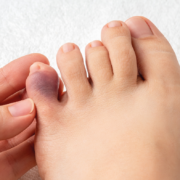Understanding Foot Bruising: Causes, Symptoms, and When to Seek Help
Bruises on the foot are often no big deal. However, in some cases, bruises come seemingly out of nowhere and cause a great deal of stress and confusion.
While this could be a sign of an underlying condition, this article (courtesy of Carrollton Foot Center) will explore various causes of foot bruises, their symptoms, and when it’s important to seek medical attention.
Common Causes of Foot Bruises
These include minor injuries like bumps, scrapes, or falls, as well as more significant events such as sprains or fractures. Repetitive activities, such as running or jumping, can also lead to microtrauma and bruising.
Poor blood flow can also make the skin more susceptible to bruising. For example, certain blood clotting disorders and some medications can increase the risk of bruising.
Diagnosis of Foot Bruises
Symptoms of bruising typically appear as a bluish-purple mark on the skin, and the bruised area may be painful or tender to the touch, swollen, and feel warm. From this information, a healthcare provider can diagnose a foot bruise based on a physical examination and your medical history.
However, sometimes additional tests may be necessary:
- X-rays: To rule out fractures or other bone injuries.
- Blood tests: To check for blood clotting disorders or other medical conditions.
- Ultrasound: To examine the soft tissues of the foot.
- MRI: To obtain detailed images of the foot and ankle.
By combining a physical examination with appropriate diagnostic tests, a healthcare provider can accurately diagnose the cause of a foot bruise and recommend the best course of treatment.
When to Worry About Foot Bruises
A Rapidly growing or color-changing bruise may be a sign of an underlying medical condition. This is especially true if the bruising doesn’t heal or appears to be worsening. In this case, it may be a sign of a blood clotting disorder.
Also, if your bruises accompany other symptoms such as numbness, tingling, or weakness, it could be a sign of peripheral artery disease.
Consult with Board-certified podiatrist Dr. Naghmeh Lilly Khavari, a renowned expert who is dedicated to her patients in Denton, Dallas, and Collins Counties. Dr. Khavari treats a wide range of problems, from ingrown toenails to foot and ankle injuries. Call Carrollton Foot Center’s office (located in Carrollton, Texas) at (469)-998-3668 to schedule your first appointment today!



